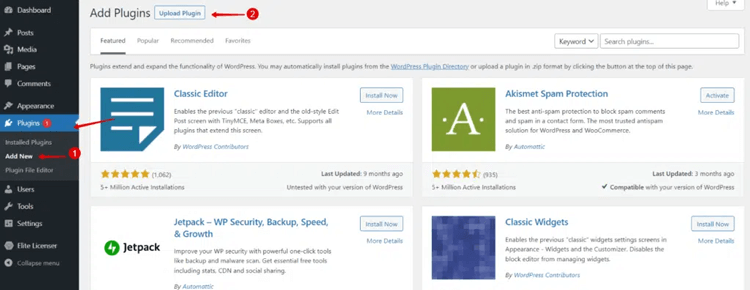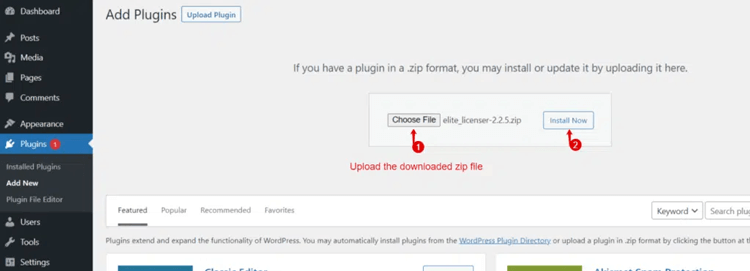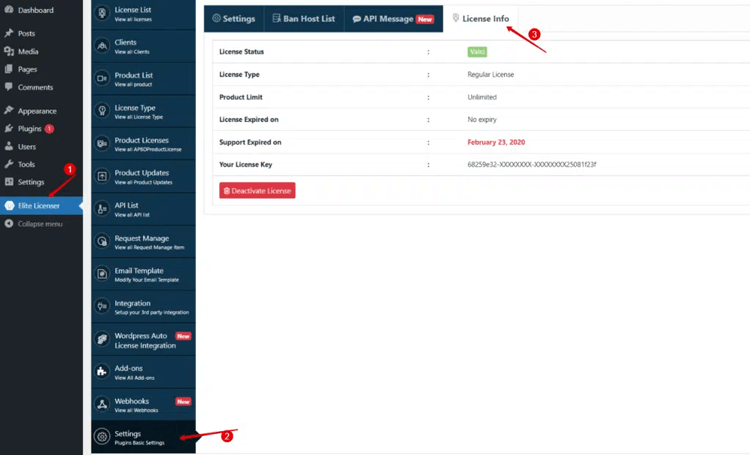How to Sell Software with Licenses: A Comprehensive Guide
Ever wanted to get your software out there but didn’t know how to protect your work and make money from it? Licensing your software is a key step to becoming a profitable software business. Software licensing allows you to grant usage rights for your software in exchange for payment. This ensures that only paying customers have access to the full features of your software.
In this comprehensive guide, we’ll walk you through everything you need to know about How to Sell Software with Licenses, from choosing the right licensing model to setting up your online store. Let’s get started!
🔐 Manage Your Software License with Elite Licenser!
Ultimate license manager for digital products. Effortlessly oversee licenses for WordPress Themes, Plugins, Joomla, and various CMS, plus PHP, .NET, Java, and Android applications
- What is a Software License?
- Importance of using licenses for your software application, plugins, or themes
- Common type of software development platform
- Challenges of selling software online
- Best practices for software license management
- How to Sell Software with Licenses
- How to choose the right license management software for your application
- Creating a website to sell your software (Recommended WordPress)
- Recommended Elite Licenser for License Management
- Frequently Asked Questions
- Conclusion
What is a Software License?
A software license is a legal agreement between the owner of a software product and the end user. It outlines the terms and conditions for using the software, including restrictions on copying or distributing it without permission.
A license also specifies the rights granted to the user, such as the number of devices on which the software can be installed or how long it can be used.
Importance of using licenses for your software application, plugins, or themes
Licensing your software is vital for protecting your intellectual property and generating revenue. Without proper licensing, anyone can access and use your code without paying for it, harming your business and devaluing the hard work you put into developing your software.
Utilizing licenses for your software applications, plugins, or themes is important for various reasons:
Legal Compliance
Licensing ensures that your software operates within the legal framework. It defines the terms under which users can use, distribute, or modify the software, helping you avoid legal complications.
Protection of Intellectual Property
Licenses serve as a means to protect your intellectual property rights. By specifying the terms of use, you control how others can use, distribute, or modify your software, safeguarding your creations.
Revenue Generation
Licensing provides a mechanism for generating revenue from your software. Whether through one-time purchases, subscriptions, or usage-based fees, licensing allows you to monetize your products and sustain ongoing development efforts.
User Accountability
Licensing establishes a contractual agreement between you and the users. This agreement defines the responsibilities and restrictions, holding users accountable for adhering to the specified terms and conditions.
Version Control
With licenses, you can control which version of your software users can access. This is crucial for managing updates, bug fixes, and feature enhancements, ensuring users use the latest and most secure versions.
Support and Maintenance
Licensing facilitates the provision of support and maintenance services. Users with valid licenses are typically entitled to assistance, updates, and patches, enhancing their overall experience and satisfaction.
Flexibility in Usage Terms
Different licensing models allow you to tailor usage terms to fit your business model. Whether you choose open-source licenses, commercial licenses, or subscription-based models, you have flexibility in how you want users to access and use your software.
Building Trust with Users
Clear and transparent licensing builds trust with your user base. Users appreciate knowing the terms under which they can use your software, and this transparency contributes to a positive relationship between developers and users.
Preventing Unauthorized Use
Licensing helps prevent unauthorized use and distribution of your software. It acts as a deterrent against piracy and ensures that only legitimate users can access and benefit from your creations.
Community and Ecosystem Growth
Licensing can foster a community around your software. Open-source licenses, for example, encourage collaboration, contributions, and the growth of an ecosystem around your product.
Recommended Blog for You:
👉 5 Email UX Design Practices and Template Examples
👉 How to Find Page ID in WordPress: A Complete Guide
👉 The Best WordPress Plugins for Educational Websites
👉 Best WordPress Mega Menu Plugins for Elementor 2024
👉 Benefits of Multi-Step Checkout: Boosting Conversions and Customer Satisfaction
Common type of software development platform
There are several types of software development platforms, each with specific licensing options. Some common types include:
WordPress
WordPress is one of the most popular open-source CMS platforms for creating and selling software products with licenses. It offers various licensing plugins and tools to help developers protect their work and generate revenue, making it an excellent choice for any developer looking to sell software online.
PHP Application
PHP (Hypertext Preprocessor) is a server-side scripting language commonly used for web development. It is embedded within HTML code and executed on the server, generating dynamic web pages. PHP is versatile and well-suited for various application types, ranging from small scripts to large-scale web applications.
C# .net Code
C# (pronounced C-sharp) is a programming language developed by Microsoft. When used with the .NET framework, C# is employed for building various applications, including desktop, web, mobile, and enterprise solutions. It is known for its simplicity, scalability, and strong integration with the Windows operating system.
VB.net Code
Visual Basic .NET (VB.NET) is another programming language developed by Microsoft. Like C#, it is part of the .NET framework for developing diverse applications. VB.NET is known for its ease of use, rapid application development capabilities, and strong integration with Windows-based systems.
Challenges of selling software online
Selling software online without proper licensing can present several challenges, including:
- Piracy: Without a license, anyone can access and use your software, potentially leading to piracy and lost revenue.
- Legal issues: If someone uses your code without permission or violates the terms of your license agreement, you may have difficulty enforcing legal action without clear licensing in place.
- Compatibility Issues: Ensuring the software is compatible with various devices, operating systems, and third-party applications can be complex.
- Continuous Innovation: Staying ahead of technological advancements and continuously innovating to meet user demands is essential for long-term success.
- Pricing Strategies: Determining the right pricing strategy that aligns with the value offered by the software while remaining competitive can be challenging.
- Market Saturation: Saturated markets can make it difficult for new software to gain visibility and attract a substantial customer base.
- Support and Maintenance: Effective customer support and ongoing maintenance can be resource-intensive, impacting operational costs.
Best practices for software license management
To effectively sell software with licenses, it’s essential to implement proper license management practices. Here are a few best practices to consider:
- Use a license key generator: A license key generator can help automate the process of creating and distributing unique license keys for your customers to prevent unauthorized use and piracy.
- Implement Robust License Models: Choose license models that align with your business goals, such as subscription-based, one-time purchase, or freemium models.
- Clearly outline license terms and conditions: Your end-user license agreement should clearly state the terms and conditions for using your software, including any restrictions or limitations.
- Monitor and track license usage: Regularly monitor and track the use of your licenses to ensure compliance with your agreement and prevent piracy.
- Offer customer support for licensing issues: Provide resources and support to help customers with any problems related to their licenses.
How to Sell Software with Licenses
Understanding Software Licensing
As technology and software continue to evolve, so do licensing practices. As a developer, staying informed about the latest trends and changes in the software licensing landscape is essential.
Understanding how to sell software with licenses is pivotal in maximizing revenue, protecting intellectual property, and ensuring a seamless user experience. Here are some key components to understand:
Types of Software Licenses
Several software license types are available, each with its terms and conditions. Here are a few of the most common types:
- Perpetual License: This license allows users to access and use the software indefinitely without any time restrictions.
- Subscription License: A subscription license requires users to pay a recurring fee to access and use the software for a specific period.
- Floating License: This license type allows multiple users to access the software using limited permits, typically based on the number of concurrent users.
- Freeware: Freeware is free software that can be downloaded and used without cost. However, freeware may come with certain limitations or restrictions.
- Shareware: Similar to freeware, shareware is also free to download and use. However, users are encouraged to purchase a license or donate to support the developer.
- Open-Source License: Open-source licenses give users free access to the source code of the software, allowing them to view, modify, and distribute it for any purpose.
- Commercial License: A commercial license requires payment in exchange for the right to use the software.
Licensing Terms and Conditions
Clear terms and conditions specify what users can do with the software. This includes usage limitations, redistribution rights, Warranty and liability, Termination, and any modification restrictions.
License Enforcement and Protection
Ensuring that users adhere to the licensing terms is important. License enforcement mechanisms, such as license keys, activation processes, Encryption, Digital Rights Management (DRM), and periodic audits, help protect against unauthorized use and piracy.
How to choose the right license management software for your application
Choosing the right license management software is necessary to sell your software online. Here are some key factors to consider when selecting a license management solution:
- Scalability: Your chosen software should be able to grow with your business and handle an increasing number of licenses and users.
- Flexibility: Look for a solution that allows you to customize licensing terms and conditions according to your specific needs.
- Integration: The software should be compatible with your chosen platform and other tools you use for your online business.
- Reporting and analytics: A good license management tool should provide detailed reports and analytics on license usage, compliance, and revenue.
- Customer support: Look for a provider that offers reliable customer support to assist you with any issues or concerns related to your licenses.
- Security: Your chosen software should have robust security measures to protect your licenses and prevent unauthorized use or tampering.
Creating a website to sell your software (Recommended WordPress)
Creating a website to sell your software is an effective way to reach a wider audience and generate revenue. WordPress is a recommended platform due to its flexibility, user-friendly interface, and extensive ecosystem of plugins. Here’s a step-by-step guide:
Buy Domain and Hosting
Select a memorable domain name that reflects your software or brand. Then, choose a reliable hosting provider that supports WordPress.
Install WordPress
Most hosting providers offer one-click WordPress installation. Follow the installation instructions and set up your WordPress site.
Select a WordPress themes
Choose a theme that aligns with your software’s branding and offers e-commerce functionality. You can consider themes compatible with popular e-commerce plugins like WooCommerce, Easy Digital Downloads (EDD), etc.
Install necessary WordPress plugins
Ensuring that your WordPress site has all the necessary plugins installed is pivotal. These plugins will enhance the functionality and performance of your website, especially when selling software.
Some recommended plugins for an effective software-selling website are: WooCommerce for easy product page setup and secure transactions, ShopLentor for customizable store design, Elite Licenser for comprehensive license management, SupportGenix for streamlined customer support, and HT Mega for building stunning websites faster than ever before with the incredible collection of Elementor widgets, templates, and blocks.
Customize and configure your website
Once you have all the necessary plugins installed, it’s time to customize your website and configure it for selling software with licenses.
Enhance your software presentation with dedicated pages for each product. These pages should include comprehensive descriptions, effectively showcasing the features of your software. Implement a clear and transparent pricing strategy, including potential discounts. Additionally, ensure that your license terms are transparent, covering activation, expiration, and applicable restrictions. Add high-quality images and videos showcasing your software.
Configure with a license management system for your application, theme, or plugin.
Now, we’ll demonstrate how to configure a license management system using a powerful WordPress license manager plugin called Elite Licenser.
Once you’ve purchased Elite Licenser from HasThemes, you’ll receive a downloadable plugin file and a license code. Follow these steps to install and activate the plugin:
Navigate to your WordPress Dashboard, click “Plugins,” and then “Add New.”

Choose “Upload” and select the plugin file. Click on “Install Now” and activate the plugin.

After activation, you will find the menu for Elite Licenser in your WordPress dashboard. Go to “Elite Licenser,” then “Settings,” and finally, “License Info.”
In the “License Code” field, enter your license code, and you will instantly access the license details.

If needed, you can deactivate the license later to transfer it to another WordPress installation.
Select payment gateway
A payment gateway is essential to facilitate secure online transactions. Some popular options include PayPal, Stripe, and Authorize.Net. Choose the one that best suits your business needs and integrates well with your e-commerce plugin.
Recommended Elite Licenser for License Management
Elite Licenser is an advanced software license manager plugin specifically designed for WordPress. It provides extensive control over licenses for WordPress themes, plugins, and applications across multiple platforms. Whether it’s CMS, PHP applications, .NET software, or Java and Android applications, Elite Licenser provides a robust solution to manage licenses effectively.
Key Features:
- Manual and Automated License Creation
- Usage Tracking
- User-Friendly Updates
- Integrate with Envato, WooCommerce, FastSpring, Paddle, Easy Digital Download, etc.
- Sample Code Generation
- Auto-Host Ban Feature
- Support and Expiry Time Management
- Website Tracking
- Efficient Data Export
- License Activation Report
- No Coding Required.
🔐 Manage Your Software License with Elite Licenser!
Ultimate license manager for digital products. Effortlessly oversee licenses for WordPress Themes, Plugins, Joomla, and various CMS, plus PHP, .NET, Java, and Android applications
Frequently Asked Questions
What is software selling?
Software selling refers to offering users digital applications, programs, or solutions in exchange for payment. It involves distributing, licensing, and monetizing software products. Selling software provides value to customers while generating revenue for developers.
Can I offer a free trial of my software?
Yes, offering a free trial is a common and effective strategy in software marketing. It allows users to experience the product before committing to a purchase, increasing the likelihood of conversion.
Utilize trial periods or limited-feature versions to showcase the software’s capabilities.
How can I market my software effectively online?
Effective online marketing for software includes:
1. Creating a compelling website with clear product information.
2. Implementing SEO strategies for better visibility.
3. Utilizing social media platforms for promotion.
4. Engaging in content marketing through blogs and tutorials.
5. Leveraging email marketing for direct communication with potential customers.
6. Exploring paid advertising options for targeted outreach.
Can I sell my software on multiple platforms?
Yes, selling your software on multiple platforms can broaden your audience and increase sales. Consider popular marketplaces like app stores, third-party platforms (e.g., Envato, WooCommerce), and direct sales channels.
Ensure compatibility and compliance with each platform’s policies.
How can I ensure the security of my software during online sales?
To ensure the security of your software during online sales, you can take the following steps:
1. Use secure payment gateways to process transactions.
2. Encrypt your software files and provide a secure download link to customers.
3. Regularly update your software with security patches.
4. Use license keys and track their usage to prevent unauthorized access.
Conclusion
If you’re a software developer or have created a unique software product, selling it online with licenses can effectively monetize your hard work. It can be a game-changer for your business if you do it correctly. Software licensing provides security for both you and your customers and opens up opportunities for recurring revenue streams.
In this comprehensive guide, we have covered all the essential aspects and step-by-step instructions on how to sell your software using licenses successfully. Now is the time to apply your knowledge and start seeing results.
Selling software with licenses may require initial effort like Integrating a licensing system, license key generation, legal considerations, etc. But the long-term benefits are well worth it. So go ahead and put these strategies into action now! Your success in selling software with licenses awaits.



